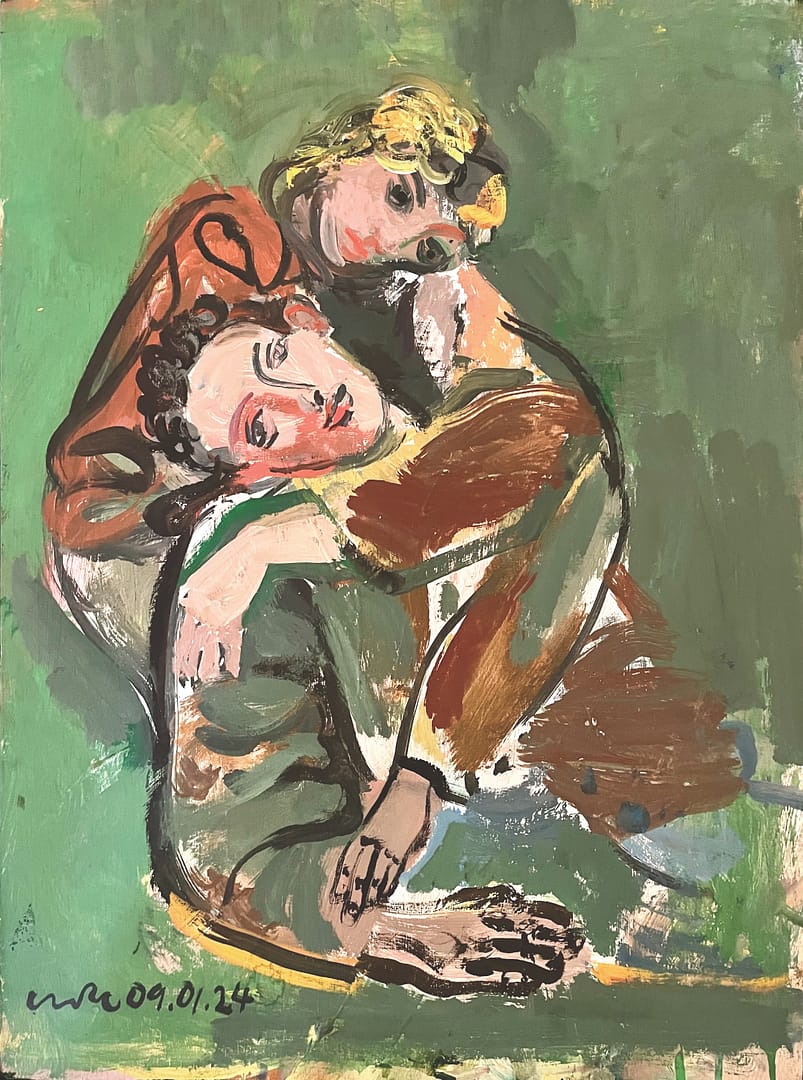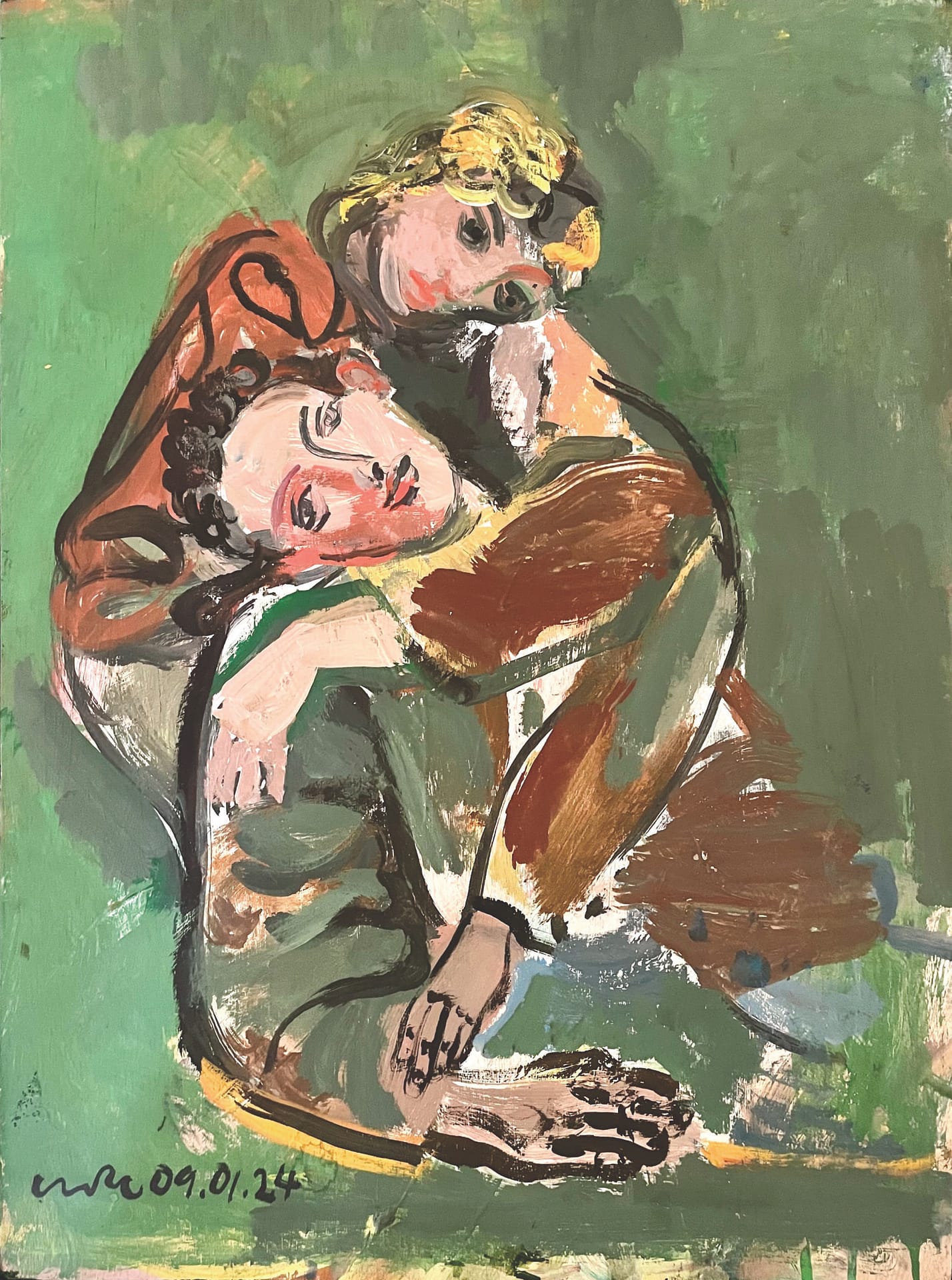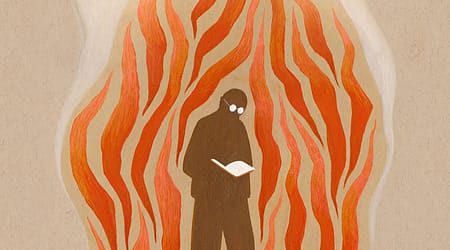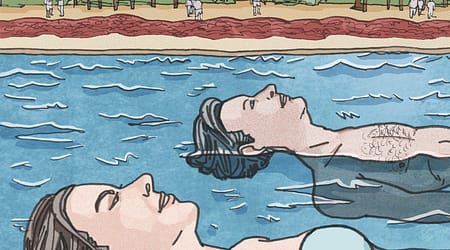My sister E’s first cataclysmic crack-up was in 2020 and played out in slow motion between March and June. Between her impending meltdown and the coronavirus, we’re all at home in a state of extreme, abiding tension. E and myself, my mom, my dad. I had gone home because New York was under lockdown and because I knew that she was crumbling. E had moved home a few months earlier, and now the pandemic accelerated the violent, aggressive inner child that had been emerging all winter, the inner child who wanted to litigate her upbringing, who wanted to explain itself and find redress for its manias and unreliabilities. I remember E holding a broken glass to her wrist, daring any of us to get closer. I remember having to hold my dad back while she stood at the top of the stairs taunting us, saying the madness would last as long as it took us to apologize.
My sister E has, at some moments, succumbed to bouts of Victorian hysteria, rocking back and forth in a linen dress, talking to God, screaming and raking at her skin. I’ve learned in family therapy that my sister has always done the opposite of what I’ve done with my life: as the older child, the boy, I was encouraged to break rules, to justify myself, to do what I wanted, and she was expected to balance out my behavior, to follow rules, to create order. She is fastidious, clean; I’m messy. She reads sheet music well; I can only improvise. I work and write fast; she works and writes slowly. And this, broadly, explains everything about us. Because I’ve been healthy, she’s become a hypochondriac; because I’ve been sane, she’s, at times, gone mad. I used to think, well, I’m stronger than my sister because I’ve not gone mad; I deserve more respect because I don’t scream or break glasses or disappear the way she does. And, at times, reciprocally, I’ve thought, I’m less artistic, less a genius, less authentic because I don’t do those things. My judgment of my sister, my hygienic, rational distinctions between our personalities were actually a rejection of a certain side of myself, and I think she would say the same about me.
My sister is a folk musician of genius who destroys or buries her music à la Vashti Bunyan or Sibylle Baier; I don’t know how many songs are on her private hard-drive; I have a few that she’s sent me—many of which she says she no longer knows how to play. We’re 18 months apart; we function as twins, as best friends; until she had her “crack-up” in 2020, we were largely known around town as the Gasdas. I only became Gasda after she left New York and spent three years working on a farm. She told me that she was only able to finally break down because my life had become more stable around that time; as if she sensed that one of us always had to play the role of the golden child, and the other of the fuckup.
E is good at so many things—a chef, a dressmaker, a musician and singer, a graphic designer, an artist, a writer, a translator (German); I don’t have anything like those skills; I can’t really work with my hands at all—only with English words.
Only in the last few years has she started to like my plays; she used to be mortified by the lack of discipline, the looseness, the absence of perfection… the amateurishness. She has a perfectionism, an obsessiveness, a demon that I never had; thus why she destroys her music, or won’t let anyone listen; thus the crack-up. I don’t mind letting things into the world—ultimately I’m a striver.
I’ve overproduced: novels, plays, screenplays, short films, poetry, blogs; E usually erases or buries whatever she completes. My sister is the more passionate one; both more religious about art, and more religious in general; she talks to God. She creates and makes for herself, to see an impulse all the way through, and for nothing and no one else. She destroys her work whenever it gets too close to completion—too close to having an audience.
Her life has jumpcuts. Last summer, she lived in a mountain hut in Sicily with a guitar, and her best friend was an old villager named Carmelo. Now she’s living with a much older man in an elegant section of Midtown. She goes to church every day now; sometimes she stops by my apartment and makes me lunch or sits in front of the fire when I’m not home.
This is the chauvinism of siblings. You learn to speak in code: short stenographic expressions, allusions to allusions. You build a private, self-justifying world that resembles one big psyche.
I embraced, even sacrificed myself to the digital, to the hybrid, to the realm of mimesis and mimetic rivalry, to “the city” and to notoriety; E chose to reject the hustle. I think there’s a connection, too, between my love of Terrence Malick films and my admiration for my sister; like Malick (who quit cinema for two decades and lived in obscurity in France), E has chosen to work in isolation, or simply to live without participating in an ephemeral, degrading culture. The life she’s chosen is the life I fantasize about (slowness, silence, nature); and maybe some part of her would like a life like mine, in the public, surrounded by collaborators and an audience.
Though my sister and I, beginning in childhood, accepted each other as friends, confidants, rivals, antagonists, equals, I never quite put my finger on the deeper, scarcer truth: you’re never just yourself. The reciprocal pull and push of forces, the quantum entanglement of family life—whereby even if you move to Europe, as my sister did after college, even if you attempt to remake yourself as a New York City personality and man about town, as I suppose that I have—keeps you still connected, still defined by the structures and imperatives set up by your parents and their parents and the whole lurching mechanism of History. Your goals, your beliefs, your feelings all tie back to your original sense of role, duty, everything necessary for the survival of the tribe—even if you reject the tribe. What you are is a melody that’s easily picked out from a tangled fugue. For E and me, getting older has meant admitting that we have each played the role of each other’s shadow, each other’s Socrates, each other’s alienated, rejected thoughts.
As we enter middle age, my sister and I, after decades of failing to be “E” and “Matt,” after failing on so many different fronts of life, with a mixture of great humility and great arrogance, are admitting, with this in mind, that we are “Gasdas” above all: composites. The antagonisms of brother and sister, of male and female, of rational and irrational, sane and insane, writer and musician, have given way to a gentle admission that there’s no truly yours or mine, but ours—a joint corporation set up by genetics, by random accident, by our parents’ favorite movies and books and so on, by all their choices, and by social and historical forces related to being two and three generations away from peasant immigrants in a Pennsylvania steel town.
Salinger’s Glass family is a useful analog for the Gasdas. The children of vaudeville actors who, through sheer precocious merit and self-education, become independent school preps. My first job in New York was as a debate coach at a prep school. My first girlfriend had gone to Harvard after prepping at Trinity. My sister’s first boyfriend at college was a tall blond European, the son of an investment banker. We, the grandchildren of Slovak and Italian immigrants, through our sheer precociousness, became visible to the upper classes—acceptable only if we could be labeled: clever friends, tutors, entertainers-in-residence.
E is Franny the mystic, obsessed with pilgrimages, God, suicide; I’m Zooey the TV star, preternaturally confident and reluctantly humane: gentle but selfish and self-obsessed. E wanted to go to Vassar, like Franny Glass does—but because the valedictorian was in love with her, and applied because she applied, E, who was only a few spots below valedictorian, lost her spot. I remember her banging her head against the floor the day she got her rejection letter. I remember cradling her head, trying to console her.
We, the grandchildren of Slovak and Italian immigrants, through our sheer precociousness, became visible to the upper classes—acceptable only if we could be labeled: clever friends, tutors, entertainers-in-residence.
We wrote a lot of letters in those days. Like Zooey Glass, I wrote and talked a big game about wisdom traditions and philosophers; I thought I had consolation and insight to offer her (and maybe I did). I remember one year I came home from college, and I would only respond to Socratic questions. E got so frustrated with me, so angry, that she threatened me with sewing shears until I stopped.
I don’t do any of these things: self-harm, bash skulls; I weep only in select moments, usually by myself, sometimes in the presence of one other person. I don’t let go, not in that way; I keep the animal in check. I keep the heart in check. I am ruled by my brain. Why am I so sane? I ask myself: why do I prioritize my own insanity? Why are even my breakdowns, my troughs of despair, so measured, so controlled?
I usually listen to albums or watch select movies when I crumble, but I do this like I’m planning for a party. I clear my schedule. Sometimes I make it to my studio and my record player—like I’m about to the throw up; but what I have to do is cry. I make it in the door, close it, and just… cry.
I think about the ecology of family: if there is someone who externalizes everything, there must be someone who internalizes. If there is someone who talks to God aloud, there is someone who talks to God silently. If one person experiences insanity, the other must curate their own healthiness and functionality.
Otherwise—the family unit? How could it survive?
Nature is wise.
Even recently, after the breakup of my engagement, all I could allow myself was listening to Cat Power’s The Greatest on my old iPod; I leave the apartment when the episode is over, go about my business. I tame, master, make submit this fundamental melancholy and sense of loss; I sublimate.
The pragmatist in me bears some responsibility for the suffering of the mystic—her suffering, the direction and fuel of her anxieties, the moral pressure she was under, the phenomenological intensity she experienced. These were not separate from my own activities and behaviors, from my brotherly attitudes, and, in a sense, from my obsessive work ethic. My haste to finish plays and novels, my tutoring company, my hustling—all of it is a photographic negative to my sister’s languid, Franny Glass despair. Somehow, between us, we’ve been able to live one whole life. Our friendship, which has survived the absurd dualism, the absurd contrast in how we’ve lived, has allowed us to feel that the fragments of our lives and works actually slot together into something bigger.
There is some salvation in the feeling that someone shares your soul but is allowed to explore it in different ways. You have less of a sense of an unlived life that way. My sister explores the possibilities of being a Gasda, of the feminine mystical, in ways that I have denied myself; I’ve achieved the name recognition that she secretly covets (but denies herself).
During that first crack-up, I remember crying for the first time ever in front of my family, or the first time since I was a little boy, and I remember moving out back to New York as soon as the buses started running back to the city. My mother moved into my aunt’s, insisting that she wouldn’t return until everyone agreed to go to group counseling.
The police found her on the side of the highway, cuffing her for her own safety; a week later I had to hold her down while my parents drove her to the ER screaming and writhing.
The second major crack-up was after E returned from Sicily this past fall and tried to re-establish a relationship with her ex-boyfriend. He rejected her coldly. This was more scary; this involved real danger. The police found her on the side of the highway, cuffing her for her own safety; a week later I had to hold her down while my parents drove her to the ER screaming and writhing.
She is doing well now—thank God—but the deeper point is this: she collapsed, broke down, begged God for mercy, because I would not. If each of us had gone halves on these great life commitments (external and internal), perhaps the results would not have been as extreme.
Can E and I ever separate our art, our work, our lives? Is her silence and oblivion not just the other side of my relentless and compulsive productivity? Is it possible that one could exist without the other?
I don’t think so. Without E—without the tangible presence of someone with whom I share so much sensibility, vision, and memory—I would have lost myself, confused myself with the “scene”—the hybrid world where perceptions and fictions (like in Borges) are incrementally accepted as fact. I would have been content to be a name, to be “that guy whose play I saw last year”—a free-floating cultural signifier at the edge of the map. I wouldn’t have felt any guilt, any self-consciousness, about becoming a socially constructed, digitally mediated personage rather than a person. I wouldn’t have fully realized there was an alternative. But my sister is the control group in the experiment; because she exists, I know that the talent, the intuition we ostensibly share doesn’t necessarily have to take the form I’ve given it; there is an alternative and an outside to the spectacle society.
Reciprocally, if and when my sister wants to sell a book or produce an album—I’m here; my life and my network is a bridge for her to cross… back to people, a career, an audience.
It’s like we understand that one day we’ll switch roles, and that we can both inhabit the infrastructure the other has built.
The “Gasdas” are another kind of hybrid—not created out of digital and material, but out of time, place, history, genetics, circumstance. “Gasda” or the “Gasda play” are not really terms that refer to me, but to the visible half of a larger personality. Matter to dark matter.
If there’s an ethical implication—an evolving metaphysics or philosophy of personality that I’m still always learning—it’s this: personality, as a fixed border or container, is a mirage; so often we’re meshes of people; there’s overlap, intertwining pathologies, destinies, programs. I feel so much less alone, I realize, having a “difficult” but profound sibling—and sharing a daemon (if not a demon) with her. My sister is why I can write female characters; and in a way, one of the main motivations for my own work is to let her speak through my characters—because she has made the difficult choice to remain off-stage, and silent.
Matthew Gasda is a writer, director, and critic; he is the founder of the Brooklyn Center for Theater Research. His book recommendation is Tolstoy: A Biography by A.N. Wilson.






